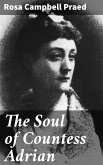In "Adrian Savage," Lucas Malet crafts a poignant narrative exploring themes of identity, ambition, and the complexities of human relationships within the rigid societal structures of Edwardian England. Characterized by its introspective prose and rich character development, the novel follows the titular character, Adrian Savage, as he grapples with his aspirations against the backdrop of a changing social landscape. Malet's writing reflects the influences of both Victorian literary traditions and the emerging modernist sensibilities of her time, marrying emotional depth with thoughtful commentary on gender and class dynamics. Lucas Malet, the pen name of Mary St. Leger Kingsley, was a remarkable figure in early 20th-century literature whose experiences traversing various social classes and cultures profoundly shaped her worldview. Educated in a literary household, Malet'Äôs writing often mirrored her fascination with intricate psychological motives and the inner lives of her characters. Her unique background and keen observations led her to explore the narrative of Adrian Savage, imbuing the protagonist with depth and complexity that resonates with readers. For those interested in nuanced character studies and the exploration of societal expectations, "Adrian Savage" stands as an essential read. Malet invites readers to reflect on their own values and aspirations through Savage's journey, making this novel not only a work of artistic merit but also one of profound relevance in contemporary discussions on identity and belonging.
Dieser Download kann aus rechtlichen Gründen nur mit Rechnungsadresse in A, B, BG, CY, CZ, D, DK, EW, FIN, F, GR, H, IRL, I, LT, L, LR, M, NL, PL, P, R, S, SLO, SK ausgeliefert werden.









